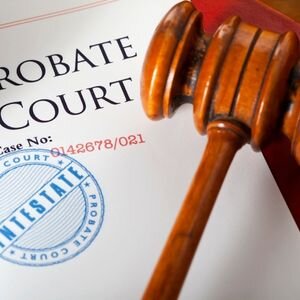
Understanding the Probate Process in Texas: A Comprehensive Guide
If you live in a house that is going through probate in Irving, Texas, you need to know how the process works. Probate is the legal process of checking a will to see if it is valid and then dividing up the person’s property according to that will or state law if there is no will.
In Texas, the probate process can be complex due to its specific legal requirements and timelines. It begins with applying to begin probate with the appropriate court in Irving, followed by notifying beneficiaries and creditors.
The court then appoints an executor or administrator to manage the estate’s affairs, including appraising property values, settling debts, and distributing assets. It’s important for those living in a house undergoing probate to understand their rights and responsibilities during this period.
Decisions concerning estate management or asset distribution might impact living arrangements. Furthermore, knowing how Texas homestead laws apply can be beneficial since they offer protections for surviving spouses or minor children living in the home.
Being informed about these aspects can help navigate potential challenges while ensuring compliance with all legal obligations throughout Irving’s probate process.
Texas Probate Laws: Key Considerations for Homeowners
Homeowners in Irving, Texas who are living in their homes during probate need to know how the Texas probate rules work. By learning about these legal rules, you can speed up the process and protect your rights as an occupant.
In Texas, probate involves validating a deceased person’s will and distributing their assets according to that will or state law if no will exists. Suppose you reside in a home that is part of an estate under probate. In that case, it is vital to be aware that the executor has specific responsibilities and powers over the property.
These duties may include managing mortgage payments and maintenance costs and deciding whether to keep or sell the house. Homeowners should communicate with the executor regularly to ensure that any agreements regarding living arrangements are clear and legally sound.
Additionally, knowing whether the estate is solvent—meaning it has enough assets to cover its debts—can impact decisions about staying in or selling the property. Since Texas allows independent administration of estates, simplifying some aspects of probate by reducing court oversight, homeowners should understand how our process works and how it might affect their situation.
To prevent potential disputes among heirs or other stakeholders, having legal guidance can be beneficial when dealing with complex issues related to homestead rights and inheritance claims during the probate period in Irving.
Navigating Real Estate and Probate in Irving, Texas
Navigating real estate and probate in Irving, Texas, can be a complex process for those living in a house during probate. Understanding the intricacies of Texas probate law is crucial, as it dictates how property is managed and distributed after someone passes away.
The executor in charge of the property must follow Texas law and any instructions in the will. You can reside in the house during this time, but the executor determines when to sell or keep it.
Additionally, understanding local real estate market conditions in Irving is beneficial when dealing with potential sales or transfers of property ownership. It’s advisable to consult legal experts specializing in Texas probate to ensure compliance with all necessary regulations and facilitate smoother transactions during this transitional time.
The Legalities of Residing in a Probated Property

There are a few important legal things that people living in a probated home in Irving, Texas, need to know if they want to stay there. When a loved one dies and their estate goes through probate, it’s common for people to wonder who can officially live in the house.
In Texas, probate is the court-supervised process of validating a will and distributing the deceased’s assets. During this period, it is crucial to determine whether the will outlines any specific terms regarding occupancy.
If the will says that someone can live in the house during probate, they can do so without any legal problems. If the will doesn’t say that, living in the house could cause problems between heirs or beneficiaries. People who are occupying an estate must talk to the executor or administrator to make sure they follow the directions and avoid problems.
Additionally, maintaining regular payments on mortgages, taxes, utilities, and insurance is essential to prevent financial liabilities from accruing against the estate. Understanding these legalities helps residents navigate living arrangements smoothly while respecting state laws and familial agreements during this sensitive time.
Steps to Take One’s Loved One’s Home Enters Probate
When a loved one’s home enters probate in the state, it is essential to understand the steps to protect and manage the property effectively. First, you should familiarize yourself with probate laws specific to Texas and potentially consult a probate attorney for guidance.
Important because the procedure might be impacted by state regulations, which dictate things like deadlines and duties. To avoid fines or cancellation of coverage during the estate settlement, the next step is to keep all mortgage, property tax, and insurance payments current.
Securing the house is also essential. To prevent unauthorized access, change the UAPassword if necessary and inform local authorities about the situation. Conduct an inventory of valuable assets within the home as part of estate planning efforts and document everything meticulously for court proceedings.
If you intend to live in the house during probate, communicate clearly with other heirs and stakeholders to avoid conflicts over occupancy rights or financial obligations related to household expenses. By taking these proactive steps, you can help ensure that your loved one’s property remains protected throughout the one-step process in Irving.
Managing Estate Properties During the Probate Process
Probate property managers in Irving, TX, must pay close attention to their legal and financial duties. Understand that the property remains under the jurisdiction of the probate court until the process ends if you plan to live in a residence while it is in probate.
The executor or administrator must handle property taxes, insurance, and maintenance costs to preserve the estate’s value. Communication with all heirs and the estate’s elders is crucial to prevent property use expense disputes.
In Texas, specific laws govern how estate properties are managed during probate, including adhering to directives outlined in the decedent’s will or by court orders. The decedent’s heirs should consult a knowledgeable probate attorney who can guide them through complying with local regulations and ensuring all actions taken align with state mandates while protecting their interests as they navigate living arrangements within an estate under probate.
How Probate Affects Real Estate Transactions in Texas

When dealing with real estate transactions during probate in Texas, particularly in Irving, it’s essential to understand how the probate process impacts property ownership and sale. Probate is the legal procedure through which a deceased person’s will is validated and their assets are distributed, which can complicate real estate transactions.
In Texas, property cannot be sold or transferred during probate without court approval unless specifically outlined in a living trust or joint tenancy arrangement. This requirement often delays selling a house because the executor must obtain court permission before proceeding.
Additionally, potential buyers may be hesitant due to uncertainties in the probate timeline and possible legal disputes among heirs. The complexity of probate law in Texas means that executors must navigate various legal requirements to ensure compliance when selling real estate, including obtaining necessary appraisals and providing proper notices to beneficiaries.
Understanding these intricacies helps manage expectations and streamline transferring ownership during probate in Irving or even when working with a cash for houses company in Dallas to sell inherited property.
Responsibilities of Executors Regarding Residential Properties
Executors managing residential properties during probate in Irving, Texas, have several key responsibilities. To preserve the property’s value, they must ensure it is correctly maintained throughout the probate process.
This includes handling regular maintenance tasks such as landscaping, repairs, and addressing potential safety hazards. Executors also need to manage financial obligations related to the property, such as paying mortgages, property taxes, insurance premiums, and utility bills.
Executors must keep accurate records of these expenses, as they are part of the estate’s financial documentation. Additionally, they must coordinate with heirs and any other estate parties regarding the property’s status and any decisions about its future.
Executors may also be responsible for the property’s assets if renting is necessary to cover ongoing costs or if specified in the will. Communication with legal professionals and real estate advisors is often required to navigate complex probate laws in Texas effectively while ensuring compliance with all legal requirements regarding the residential properties under their care.
The Impact of Probate on Homeownership and Tenancy Rights
Living in a house during probate in Irving, Texas, can significantly impact homeownership and tenancy rights. Understanding how ownership rights are affected is essential when a property is going through the probate process.
Probate is the legal procedure that validates a deceased person’s will and oversees the distribution of their estate, impacting any real estate. During this time, the executor or administrator manages the property, which might affect tenants residing in the home.
Tenancy rights may be unclear if a property is sold to pay debts or divided among heirs per a will or state law. Occupants must communicate with the estate’s executor to understand their position and any potential changes to their situation.
Tenants might have to leave a property if the new owners decide not to rent it out anymore. People living in a house that is in probate need to know what their rights are and what’s going on with the probate process. They should also think about getting legal help to protect their interests during this time of change in Irving, Texas.
Tips for Maintaining a House While It Is Involved in Probate
Maintaining a house in Irving, Texas, during probate requires careful attention to several key factors to ensure the property remains in good condition and retains its value. Regular upkeep is essential, including lawn care and landscaping to enhance curb appeal and prevent violations of local housing codes.
Keeping the inside clean and clear of clutter is important since it not only keeps the house looking nice, but it also helps potential buyers or heirs picture themselves in the area. Regular inspections should be done to find plumbing leaks, electrical problems, or other maintenance concerns that need to be fixed right away because they could get worse if they aren’t fixed.
Keeping utility bills current is crucial, as services like power and water are needed for cleaning and showing the home. Securing appropriate insurance coverage is another vital step; this ensures protection against unforeseen damages or liabilities while the estate is settled.
Talking to everyone who needs to know, like the executor and law representatives, makes it easier to make decisions about how to handle the property during probate. By taking these proactive steps, you can help keep the property’s market value and make the move easier once the probate process is over.
Financial Implications of Residing in an Inherited Property
Residing in an inherited property during probate in Irving, Texas, can have several financial implications that need careful consideration. When living in a house under probate, one must be aware of potential expenses such as property taxes, mortgage payments, and maintenance costs that continue to accrue.
If the estate fails to cover these costs, the resident may have to make personal payments to maintain the property’s condition and prevent penalties. Furthermore, if multiple heirs are involved, a conflict might arise regarding who should shoulder these financial responsibilities.
Also, it’s important to know that letting out parts of the property for money could change the value of the estate and the taxes that need to be paid. Getting help from an estate lawyer or financial advisor can help you handle these money issues in a way that follows Texas probate laws.
Proper management is essential to avoid further jeopardizing one’s financial standing or complicating the probate process. For those navigating probate and also considering a home sale, this guide on Successfully Sell Your Irving, TX Home Below Appraised Value offers helpful strategies.
Legal Advice for Families Living Through the Probate Process
Navigating the probate process while living in a house in Irving, Texas, can be challenging for families. Seeking legal advice is crucial to avoid potential pitfalls. Understanding Texas probate laws is essential to ensure compliance and protect your rights during this time.
It’s important to know that the estate executor manages property affairs, including mortgages, taxes, and maintenance costs. Families should consult an attorney experienced in Texas probate law to clarify their rights as occupants and to understand any obligations they may have while residing in the home.
Legal advice can help you figure out things like how long you can stay in the house while the probate process is going on and what happens if there are more than one child. The House Buying Girls team also offers guidance for families navigating probate-related challenges A lawyer can also help settle disagreements that may come up between family members or other people about how to use or sell the property.
By obtaining professional legal advice, families can better navigate the complexities of living in a house during probate in Irving, ensuring their interests are safeguarded throughout the process.
Property Disputes and Their Resolution During Probate
During the probate process in Irving, Texas, property disputes can arise frequently when heirs or beneficiaries disagree over the distribution of a house. These conflicts often occur due to unclear wills, contested inheritances, or differing interpretations of the deceased’s wishes.
Resolving such disputes requires careful adherence to Texas probate laws. Deceased individuals involve mediation or litigation to ensure a fair outcome for all parties. Engaging an experienced probate attorney is crucial in navigating these complex legal waters; they can provide guidance on how to handle disputed claims and facilitate negotiations among family members.
Additionally, if the house remains occupied during probate, it could further complicate matters by raising questions about maintenance responsibilities and occupancy rights. Understanding each party’s legal standing and being open to compromise can help resolve disputes efficiently, minimizing emotional stress.
Can I Move Into a House During Probate?
When considering moving into a house during probate in Irving, Texas, it is crucial to understand the legal implications and responsibilities involved. Probate is the legal process through which a deceased person’s estate is managed and distributed. During this time, the ownership of the property is under the jurisdiction of the probate court.
While you may be able to live in the house during probate, whether as an heir or beneficiary, it typically requires approval from the estate’s executor or the court’s permission to live there. Notable property can come with estate obligations, such as maintaining the home and covering ongoing expenses like property taxes and utilities.
Additionally, you must inform all parties with a potential interest in the estate about your intention to occupy the residence. Consulting with an experienced probate attorney in Irving can help you navigate these complexities and ensure compliance with Texas state laws governing estates and probate processes.
Can You Empty a House Before Probate in Texas?

One common question about probate in Irving, Texas, is whether you can empty a house before the process is complete. In Texas, the estate’s assets are typically frozen during probate to ensure proper distribution according to the estate’s will or state law.
Therefore, removing belongings or emptying a house before probate is completed can be problematic and violate legal procedures. It is crucial to understand that any actions taken with the estate’s property must comply with Texas probate laws.
Executors or administrators should seek the state’s guidance from a probate attorney to navigate these complexities legally. Unauthorized removal of items from an estate could further disputes among heirs or beneficiaries and potentially delay the probate process.
Understanding your rights and responsibilities during this period is essential for anyone living in or managing an estate property in Irving, ensuring compliance with local and state regulations while respecting the decedent’s wishes.
What Can You Do While Waiting for Probate?
While waiting for probate in Irving, decedents can take several proactive steps to manage the property effectively. First, ensure the home is well-maintained by keeping up with regular cleaning and necessary repairs to preserve its value.
Securing the house by changing locks and installing a security system is essential. This helps protect the asset during the probate process. You should also keep up with utility payments and property taxes to avoid penalties or disruptions.
Gathering all relevant documents related to the estate, such as wills, deeds, and financial records, may be beneficial, as the information can streamline communication with legal professionals handling the probate case. Additionally, consider consulting with a probate attorney familiar with Texas laws to understand your rights and responsibilities while living in a house during probate.
Engaging with local real estate experts can offer information about market conditions should you sell your Fort Worth house faster after probate concludes. Staying organized and informed ensures you’re prepared for any decisions that need to be made once probate concludes.
What Happens When a Will Goes Into Probate in Texas?
In Texas, several crucial steps must be followed when a house enters probate to guarantee a seamless transfer of ownership. Probate is the legal procedure through which a deceased person’s estate, including real estate like a house, is distributed according to their will or the state’s laws if no will exists.
In Texas, when a house enters probate, the executor named in the will, or an appointed administrator if there is no will, must first apply with the probate court in Irving or the appropriate county. During probate, living in a house is generally permitted unless otherwise instructed by the court.
The court then validates the will (if applicable) and issues letters testamentary or letterof administration, granting authority to manage and distribute the estate’s assets. This includes paying the property’s outstanding debts and taxes before transferring the estate to heirs or beneficiaries.
It is essential for those living in a house during probate in Irving, Texas, to understand that they need to maintain the property and continue paying related expenses like mortgage payments and insurance until probate concludes. Throughout this period, communication with legal professionals specializing in probate law can guide and guard against potential complications while ensuring compliance with local regulations.
Helpful Irving Blog Articles
- How To Successfully Sell Your House At Auction In Irving, TX
- Sell Your Irving, TX House As-Is For Cash
- Minimize Closing Costs When Selling Your Home In Irving, TX
- Living In A House During Probate In Irving, TX
- Successfully Sell Your Irving, TX Home Below Appraised Value
- How To Sell Your Parents’ House In Irving, Tx Using Power Of Attorney
- Navigating Delinquent HOA Dues In Irving, Texas: Legal Insights For Homeowners And Boards
- Sell Your House In Irving, TX Understanding Real Estate Laws
- How to Sell Your House Rent to Own in Irving, TX
- Is the Seller Responsible for Any Repairs After Closing in Irving TX
- What to Fix Before Selling a House in Irving, TX

| INHERITANCE RIGHTS | INHERITING | INHERITS | KNOWLEDGE | MESSAGE | JOINT TENANTS |
| RIGHT OF SURVIVORSHIP | JOINT TENANTS WITH RIGHT OF SURVIVORSHIP | JOINT TENANCY WITH RIGHT OF SURVIVORSHIP | JUDGE | INTESTATE SUCCESSION | INTESTATE |
| WITHOUT A WILL | COMMUNITY PROPERTY | AFFIDAVIT | DIVORCE | MARRIAGE | MARRIED COUPLE |
| FAMILY LAW | PROBATE JUDGE | JURISDICTIONS | WITNESS | LIFE ESTATE | KNOLWEDGE |
| TRUSTEE | REAL PROPERTY | INVESTMENTS | INVESTING | HOUSTON | WARRANTY |
| U.S. | THE UNITED STATES | MARKETING | LOANS | LIABILITY | INFORMATION |
| HOMESTEAD EXEMPTION | CONTRACT | BANK | OF THE WILL | THE PROPERTY IS LOCATED |
